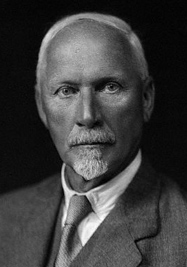Jan Smuts
|
|
Jan Christiaan Smuts, (May 24, 1870 - September 11, 1950) was a prominent South African statesman and soldier. He was also a lawyer and intellectual.
| Contents |
Early Life
Jan Christiaan Smuts was born into a wealthy Afrikaner family on the Bovenplaats farm , near Riebeeck West, in the Cape Colony. He first went to school at age 12, going to Victoria College four years later to study science and arts. At Christ's College, Cambridge he read law.
Unification
Smuts was a supporter of Cecil Rhodes, and a great anglophile, until it was revealed that Rhodes had instigated the fateful Jameson Raid by a group of Uitlanders on the Transvaal Republic. In 1898, Smuts moved from the Cape to practice law in Johannesburg where he became State Attorney. He later became a Minister in the Transvaal government led by Paul Kruger until the outbreak of the Boer War.
During the Boer War he led a Boer Commando in the Cape Colony and showed a great aptitude for guerrilla tactics. After the Transvaal elections in 1907, Smuts joined the cabinet formed by Louis Botha. Frustrated by the procrastination of the Afrikaner, and the uneasiness of many of his colleagues with cooperating with the British, Smuts disowned the Afrikaner in 1908, declaring himself to be a South African instead.
Soldier and Statesman
When the Union of South Africa was formed, in 1910, he became a minister of a Botha-led government until the outbreak of World War I, when he rejoined the army. He formed the South African Defence Force, and was instrumental in the conquest of German East Africa. In 1917 he was invited to join the Imperial War Cabinet by David Lloyd George. In 1918, Smuts helped to create a Royal Air Force, independent of the army.
Smuts and Botha were key negotiators at the Paris Peace Conference. Both were in favour of reconcilation with Germany and limited reparations. Smuts advocated a powerful League of Nations, which failed to materialise. The Treaty of Versailles gave South Africa a mandate over Namibia, which was occupied from 1919 until withdrawal in 1990.
Smuts returned to South African politics after the conference. When Botha died in 1919, Smuts was elected Prime Minister, serving until a shock defeat in 1924 at the hands of the National Party.
Second World War
After nine years in opposition and academia, Smuts returned as Deputy Prime Minister in a 'grand coalition' government under Barry Hertzog. When Hertzog advocated neutrality towards Nazi Germany in 1939, he was deposed by a party caucus, and Smuts became Prime Minister for the second time. He had served with Winston Churchill in World War I, and had developed a personal and professional rapport. Smuts was invited to the Imperial War Cabinet in 1939 as the most senior South African in favour of war. In 28 May 1941, Smuts was appointed a Field Marshal of the British Army, becoming the first South African to hold that rank. This close cooperation with Churchill made Smuts very unpopular amongst the Afrikaner, leading to his eventual downfall.
In May 1945, he represented South Africa in San Francisco at the drafting of the United Nations Charter. Just as he did in 1919, Smuts urged the delegates to create a powerful international body to preserve peace; he was determined that, unlike the League of Nations, the UN had teeth. Smuts signed the Paris Peace Treaty, resolving the peace in Europe, thus becoming the only signatory of both the treaty ending the First World War, and that ending the Second.
His preoccupation with the war had severe political repercussions in South Africa. Smuts' support of the war and his support for the Fagan Commission made him unpopular amongst the Afrikaner and Daniel François Malan's pro-Apartheid stance won the National Party the 1948 election. Although widely forecast, it is a credit to Smuts' political acumen that he was only narrowly defeated (and, in fact, won the popular vote). Smuts retired from politics, and four decades of Apartheid followed.
He died on September 11th 1950, on his family farm of Doornkloof, Irene, near Pretoria and his ashes scattered on Smuts Koppie near the farm.
Miscellaneous
In 1931, he became the first foreign President of the British Association for the Advancement of Science.
In 1948, he was elected Chancellor of Cambridge University, becoming the first foreigner to hold that position. He held the position until his death.
He is remembered also for the coining of the terms holism and holistic: abstractions not unnaturally linked to his political concerns. The earliest recorded use of the word "apartheid" is also attributed to him, from a 1917 speech.
Smuts was an amateur botanist, and a variety of grass is named after him.
Johannesburg International Airport was formerly named after him when it was known as Jan Smuts Airport.
The premier men's residence at the University of Cape Town, Smuts Hall, is named after him.
In 2004 he was named as one of the top ten Greatest South Africans.
| Preceded by: Louis Botha | Prime Minister of South Africa 1919–1924 | Succeeded by: James Barry Munnik Hertzog |
| Preceded by: James Barry Munnik Hertzog | Prime Minister of South Africa 1939–1948 | Succeeded by: Daniel François Malan
Biography of Jan Christian Smuts http://www.lenel.ch/peet/smuts.htm af:Jan Christian Smuts |

